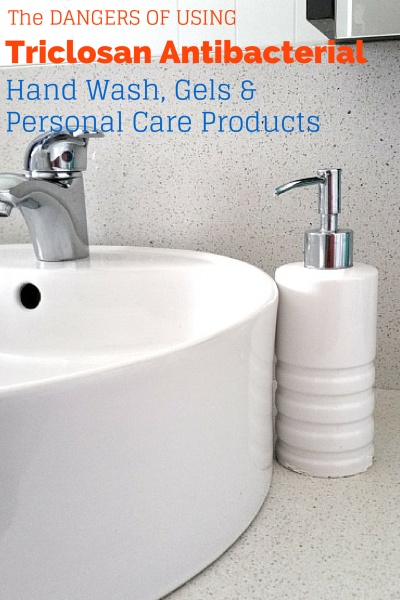 Triclosan, The Dangerous Ingredient in Antibacterial Personal Care Products.
Triclosan, The Dangerous Ingredient in Antibacterial Personal Care Products.
Triclosan a common ingredient in antibacterial soaps, sanitizers, hand gels, toothpaste & cosmetics etc.
Triclosan enters our blood stream and accumulates in human tissue and Triclosan leads to the development of antibiotic resistant bacteria.
Companies don’t tell us these little nuggets when they are pushing their Triclosan based, antibacterial products!
Yes We Do Need Antibacterial Products.
There are times when antibacterial products are important for use; e.g in hospitals and when we are unable to wash with soap and water etc. But we have become a society, obsessed with reaching for germ killing products and we are overusing them.
It is not uncommon to find bottles of the stuff, placed strategically throughout family homes. Soap and water have been super seated by these germ killing gels, and liquid soaps, but is this wise choice?
Yes sometimes a hand sanitizer is necessary, but there are safer, cruelty-free, natural, alternatives to Triclosan based ones.
Triclosan Health Concerns
This report on Triclosan by the FDA sheds some more light on the fact that our recent addiction to constantly using anti-bacterial Triclosan hand gels and soaps etc. could in the long run. be doing us and the environment. a lot more harm than good!
- Triclosan is a hormone disruptor, that have been shown in animal studies to alter hormone regulation.
- Triclosan is in just about every product available to us, including plastic toys, cutting boards, mouse pads and even infused into fabrics. We are being seriously over-exposed to Triclosan and this is a major concern to scientists, as they are seeing evidence that is leads to the development of antibiotic resistant bacteria. If antibiotics are no longer able to kill off bacteria, this poses an incredibly, serious danger to us all, read this European Health Report and this PubMed report.
- Triclosan accumulates in our bodies by entering our blood stream and storing in our fat cells.
- Triclosan also harms the general eco-system, as it ends up being washed down our drains and into our waterways , when we wash it off our hands.
http://www.buzzle.com/articles/antibacterial-soap-dangers.html
Hand Gels and Commercial Anti-bacterial Soaps often are manufactured by companies that conduct animal testing and use a number of other questionable ingredients including; petrochemicals, parabens, artificial fragrances and colours etc.
Visit the Environmental Working Group (EWG) and try typing in the current brand of antibacterial soaps, gels and other toiletry products you use and see what ingredients they contain and the health concerns linked to them.
Safer Natural Ways To Clean & Disinfect Your Hands
- Use antibacterial hand gels, lotions, wipes and spray only when you can’t get to clean water and plain natural liquid or bar soap. Hand washing using a cruelty free soap is still the most effective way to clean hands, especially when visibly soiled.
- Choose natural based, cruelty-free, safer disinfecting products in your home.
- Choose to use only Triclosan free hand gels, wipes and sprays.
- Be selective about what actually needs disinfecting. We all need to build up our immune system and this especially applies to young children. Some bacteria and dirt exposure is important.
- Don’t have alcohol based gels lying around the house, where young children can get to them. There have been cases of alcohol related poisonings, after small children ingested these gels. Adults need to be responsible and monitor children closely when using these gels.
- Make a habitat to read labels and the ingredients of all products you buy and avoid ANY products that use Triclosan and other artificial ingredients.
Cruelty Free Cleaning & Disinfecting Products
Always choose accredited cruelty free soaps, and disinfectants and cleaning products, by ethical companies.
Animal testing does still go on and the tests that these animals are subjected to are horrific and extremely painful, often resulting in death. I recommend always consulting the list at Cruelty Free International and their Leaping Bunny Programme.
You cannot trust what a company may write on their product. Companies may deceive customers and claim they’re cruelty free, when in-fact there is animal testing at some stage of production of their products. See more in my article Animal Testing do your part to stop it. and Cruelty Free Cosmetics How To Be Sure Your Cosmetics Truly Are Not Tested On Animals
Before you leave, if you enjoyed this article sign up to LivingSafe and stay informed! LivingSafe helping you live healthier & safer.
Some other natural health and personal care articles you may find interesting
Mineral Makeup Benefits vs Conventional Makeup
Applying Mineral Makeup Professionally Is Easy
Synthetic Perfumes Making Us Sick
Animal Testing Of Cosmetics Do Your Part To Stop It
Hair Colouring How Safe Is It?
Formaldehyde in Hair Straightening and Hair Styling Products
Fake Tan Risks & Dangers What You Should Know
Browse more helpful articles in my Personal Care section here.
Leave a Reply
You must be logged in to post a comment.